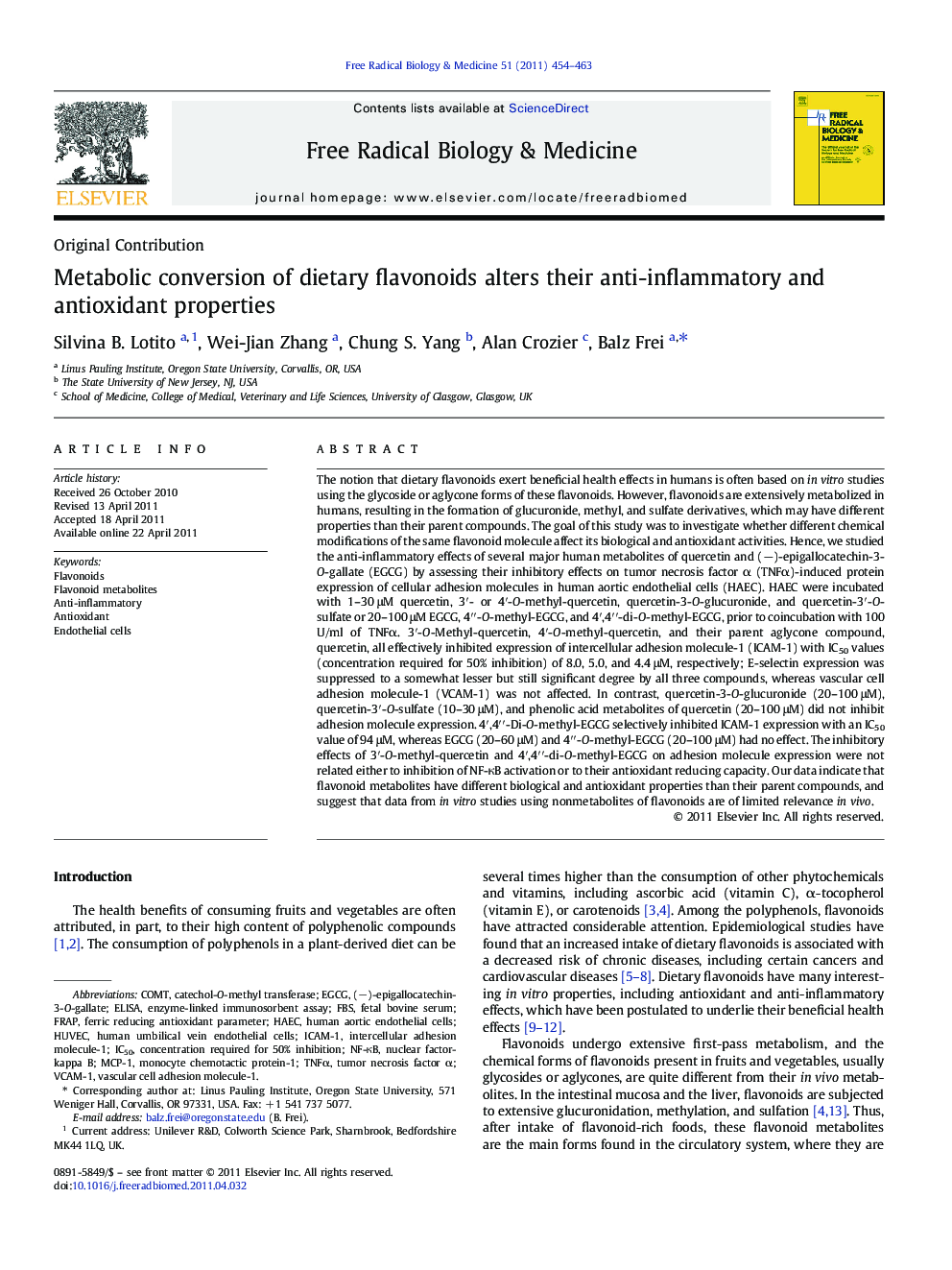| کد مقاله | کد نشریه | سال انتشار | مقاله انگلیسی | نسخه تمام متن |
|---|---|---|---|---|
| 10738078 | 1046682 | 2011 | 10 صفحه PDF | دانلود رایگان |
عنوان انگلیسی مقاله ISI
Metabolic conversion of dietary flavonoids alters their anti-inflammatory and antioxidant properties
دانلود مقاله + سفارش ترجمه
دانلود مقاله ISI انگلیسی
رایگان برای ایرانیان
کلمات کلیدی
NF-κB(−)-epigallocatechin-3-O-gallateVCAM-1COMTMCP-1HUVECICAM-1FRAPEGCGFBSTNFαIC50Antioxidant - آنتی اکسیدانHAEC - اینEnzyme-linked immunosorbent assay - تست الیزاELISA - تست الیزاtumor necrosis factor α - تومور نکروز عامل αfetal bovine serum - سرم جنین گاوHuman umbilical vein endothelial cells - سلول های اندوتلیالی ورید ناف انسانEndothelial cells - سلولهای اندوتلیالhuman aortic endothelial cells - سلولهای اندوتلیال آئورت انسانAnti-inflammatory - ضدالتهابconcentration required for 50% inhibition - غلظت مورد نیاز برای مهار 50٪ استNuclear factor-kappa B - فاکتور هسته ای-کاپا BFlavonoids - فلاونوئیدهاintercellular adhesion molecule-1 - مولکول چسبندگی بین سلولی -1vascular cell adhesion molecule-1 - مولکول چسبندگی سلولی عروقی-1Monocyte chemotactic protein-1 - پروتئین chemotactic monocyte-1catechol-o-methyl transferase - کاتچول-ات-متیل ترانسفراز
موضوعات مرتبط
علوم زیستی و بیوفناوری
بیوشیمی، ژنتیک و زیست شناسی مولکولی
سالمندی
پیش نمایش صفحه اول مقاله

چکیده انگلیسی
The notion that dietary flavonoids exert beneficial health effects in humans is often based on in vitro studies using the glycoside or aglycone forms of these flavonoids. However, flavonoids are extensively metabolized in humans, resulting in the formation of glucuronide, methyl, and sulfate derivatives, which may have different properties than their parent compounds. The goal of this study was to investigate whether different chemical modifications of the same flavonoid molecule affect its biological and antioxidant activities. Hence, we studied the anti-inflammatory effects of several major human metabolites of quercetin and (â)-epigallocatechin-3-O-gallate (EGCG) by assessing their inhibitory effects on tumor necrosis factor α (TNFα)-induced protein expression of cellular adhesion molecules in human aortic endothelial cells (HAEC). HAEC were incubated with 1-30 μM quercetin, 3â²- or 4â²-O-methyl-quercetin, quercetin-3-O-glucuronide, and quercetin-3â²-O-sulfate or 20-100 μM EGCG, 4â²â²-O-methyl-EGCG, and 4â²,4â²â²-di-O-methyl-EGCG, prior to coincubation with 100 U/ml of TNFα. 3â²-O-Methyl-quercetin, 4â²-O-methyl-quercetin, and their parent aglycone compound, quercetin, all effectively inhibited expression of intercellular adhesion molecule-1 (ICAM-1) with IC50 values (concentration required for 50% inhibition) of 8.0, 5.0, and 4.4 μM, respectively; E-selectin expression was suppressed to a somewhat lesser but still significant degree by all three compounds, whereas vascular cell adhesion molecule-1 (VCAM-1) was not affected. In contrast, quercetin-3-O-glucuronide (20-100 μM), quercetin-3â²-O-sulfate (10-30 μM), and phenolic acid metabolites of quercetin (20-100 μM) did not inhibit adhesion molecule expression. 4â²,4â²â²-Di-O-methyl-EGCG selectively inhibited ICAM-1 expression with an IC50 value of 94 μM, whereas EGCG (20-60 μM) and 4â²â²-O-methyl-EGCG (20-100 μM) had no effect. The inhibitory effects of 3â²-O-methyl-quercetin and 4â²,4â²â²-di-O-methyl-EGCG on adhesion molecule expression were not related either to inhibition of NF-κB activation or to their antioxidant reducing capacity. Our data indicate that flavonoid metabolites have different biological and antioxidant properties than their parent compounds, and suggest that data from in vitro studies using nonmetabolites of flavonoids are of limited relevance in vivo.
ناشر
Database: Elsevier - ScienceDirect (ساینس دایرکت)
Journal: Free Radical Biology and Medicine - Volume 51, Issue 2, 15 July 2011, Pages 454-463
Journal: Free Radical Biology and Medicine - Volume 51, Issue 2, 15 July 2011, Pages 454-463
نویسندگان
Silvina B. Lotito, Wei-Jian Zhang, Chung S. Yang, Alan Crozier, Balz Frei,